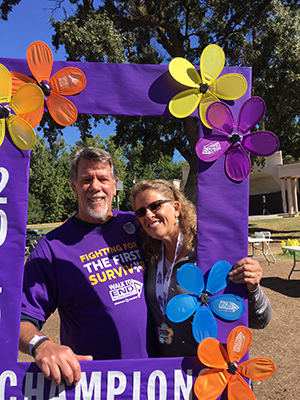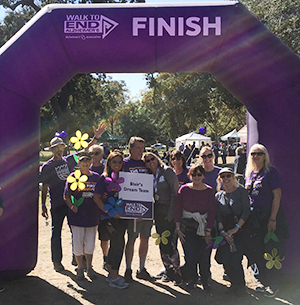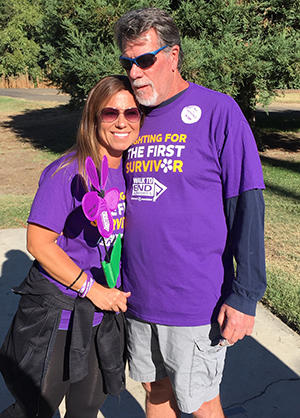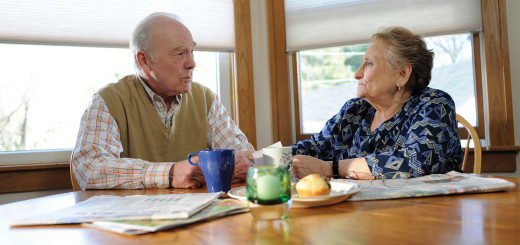Sonora residents encourage you to live your life to the fullest
When Sheri and Blair received Blair’s dementia diagnosis, they refused to accept life was over. The couple sold their home and moved to Sonora to live life to the fullest and encourage others to do the same.

A letter from the boss
It’s never a good sign when your boss writes a letter to you raising questions about your work and if things don’t change, you’ll be fired. This letter came as a complete shock to Sheri, who had no idea her husband Blair was having such a hard time at work.
At the time, Blair had been working as a photo editor for the Associated Press for 27 years and loved his job. Sheri said, “The odd things he was doing at work weren’t things he was doing at home, so I never noticed.”
Blair’s work recommended he take advantage of short-term disability to take some time to figure out what was going on. Sheri said, “If it hadn’t been for the short-term disability, Blair would have lost his job. By going on disability, he was able to retire and keep his benefits.”
Getting a diagnosis
Because Blair was only 58 at the time, many doctors refused to believe that there was anything wrong with him. Eventually, Blair found a neurologist who wasn’t necessarily convinced it was dementia, but still decided to send them to UCLA for further testing.
It took a long time, but eventually Blair received a dementia diagnosis. “Sitting with the doctor that day, he made it sound like it was over for us,” shared Sheri. “He didn’t say anything encouraging. We got home, made a drink, sat on the porch and made a plan.”
Starting over
Within three months of the diagnosis, Sheri and Blair sold their home in Southern California and moved to Sonora, a small town at the foothills of the Sierras. “We’ve been coming up to Sonora for years,” said Sheri. “Blair has family that lives here and we always wanted to retire here.”
“We literally came home from the doctor that day and put the house up on the market. We sold the house and moved in with Blair’s mom. It took us six more months to find our dream home. We just started our lives over. We love it here.”

Problems in public
For the most part, Blair and Sheri are able to go out and live a mostly normal life. However, there is one big problem they constantly run into. Using a public restroom. Blair’s dementia has caused damage to the posterior cortex of the brain, which affects vision, specifically when it comes to judging distances.
“He’s had problems with his vision since the diagnosis,” said Sheri. “He has trouble with depth perception. His memory isn’t great, but I’d say he has more trouble with his vision than with his memory.”
Sheri and Blair want to continue to live their life as a normal couple for as long as possible. “We don’t want to stay home,” said Sheri. “When you look at Blair you see a strong healthy normal looking guy. He just has a hard time going to the bathroom because he can’t find the toilet.
“The beauty of living in a small town is that we see the same people everywhere we go. The whole community knows who we are and that makes it easier. It’s when we leave the area and go somewhere else, that we run into problems. It’s the one thing I wish we could change.”
In small restaurants, or places with a family restroom Sheri has no problem taking Blair to the bathroom. However, when they are in bigger establishments they run into problems. “Some people think he’s drunk,” said Sheri. “I’ve been yelled at by staff, and had security called for going into the wrong restroom. I explain that he has dementia and usually people are pretty understanding.”
For situations like these, the Alzheimer’s Association® offers courtesy cards for caregivers. These cards are the same size as a business card and fit easily into your wallet. The cards are given by caregivers to staff and other patrons to let them know that your companion has dementia and asks for their patience and support.
Living their life to the fullest
Despite their issues when it comes to finding restrooms, Sheri and Blair haven’t stopped living their best life. After their move to Sonora, they made new friends and built a support system made of both friends and family.
Next they continued living their life to the fullest. “We were doing the things we’d always done,” said Sheri. “We go camping with friends, we go hiking, biking and dancing. We love to sit on our back deck and listen to music. It’s the best life.”
Blair agrees, “I like to go out and see my friends.”

Finding Walk to End Alzheimer’s®
Sheri has done a few cancer walks for her mother in the past, so when she saw an ad on TV for the Walk to End Alzheimer’s, she called up her local office to find out more. “I was connected with Cheryl Schrock, the Walk Manager for both Modesto and Merced,” said Sheri. “Cheryl wanted us to come to the Modesto Walk. We have friends in Merced, it’s an easy drive for us and it’s a smaller town, which is better for Blair.”
Last year, Sheri and Blair raised over $4,000 from their friends and family. Even a local financial advisor made a donation. Sheri said, “I was blown away by the amount of money we raised. This is the kind of community Sonora is.”
Raising awareness
Because Walk to End Alzheimer’s is taking place in every community nationwide, Sheri and Blair will walk their neighborhood this year. Sheri says, “We’ll do something this year, even if it’s just at our house.”
Sheri reminds people that the reason why they walk is to raise awareness for the disease. “It’s affecting younger and younger people,” said Sheri. “It’s not just an old person’s disease. Whenever Blair did something odd, I never once thought “˜Oh, this might be Alzheimer’s.’ I thought you had to be in your 70’s to get it.”
“We want to spread our message of joy. For a lot of people, when they get the diagnosis, they think it’s over. It isn’t over for us, and I’m not giving up.”
We encourage you to Walk with your friends and family in your community this Walk season. You can join Sheri and Blair’s team, Blair’s Dream Team or start your own team for the Merced Walk on October 3. We’re still coming together in 2020, even if it means trying something new. Learn about Walks in your area at alz.org/walk.
Learn more:

















